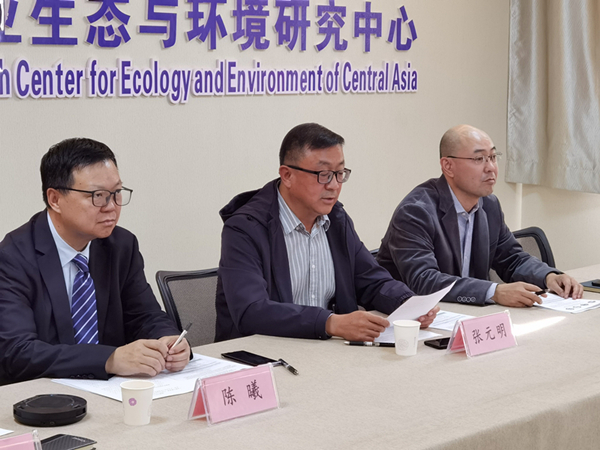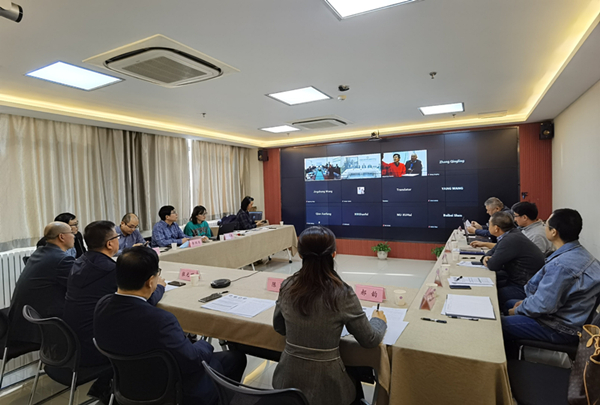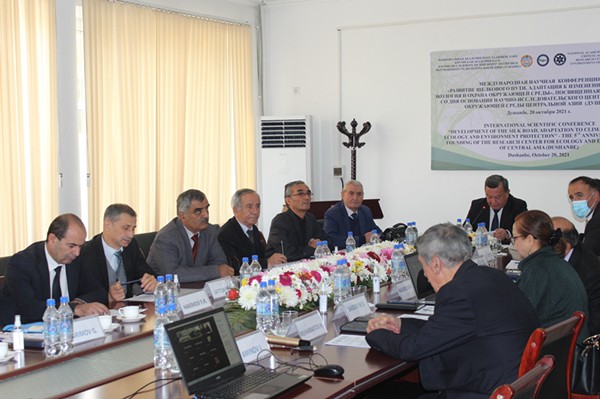The International Academic Seminar on Silk Road Development, Climate Change Adaptation and Eco-environmental Protection and the Fifth Anniversary of RCEECA Dushanbe Sub-centre is successfully held
The International Academic Seminar on Silk Road Development, Climate Change Adaptation and Eco-environmental Protection, with the theme of focusing on eco-environmental changes and scientific and technological cooperation in Central Asia, was held both online and offline on October 20, and the sub-regional seminars in Urumqi and Dushanbe were set up.
The Seminar was held by Research Center for Ecology and Environment of Central Asia (hereinafter referred to as RCEECA), Xinjiang Institute of Ecology and Geography CAS and Academy of Sciences of Tajikistan, and organized by RCEECA Dushanbe Sub-centre and Xinjiang Society of Natural Resources. Farhod Rahimi, President of Academy of Sciences of Tajikistan, Researcher Chen Xi, Secretary of Xinjiang Branch of CAS and Director of RCEECA, and Researcher Zhang Yuanming, Director of Xinjiang Institute of Ecology and Geography attended the Seminar and deliver speeches.
Chen Xi said as this year marked the fifth anniversary of RCEECA Dushanbe Sub-centre and the 70th anniversary of Academy of Sciences of Tajikistan, with the joint efforts of the Chinese Academy of Sciences and Academy of Sciences of Tajikistan, a joint research center with modern research equipment and conditions had been built over the past five years, and breakthroughs had been made in such aspects as platform construction, cooperative research, talent cultivation and academic exchanges, and it was hoped that in the future, China and Tajikistan would make better use of the cooperative research platform of Dushanbe Sub-centre to attract and pool more scientific research forces and international resources, make active efforts to cope with and solve regional ecological and environmental issues and livelihood issues, and provide scientific and technological support for the sustainable development of the two countries.
Zhang Yuanming pointed out that for a long time, Xinjiang Institute of Ecology and Geography and Academy of Sciences of Tajikistan had carried out a series of fruitful cooperation in the field of eco-environmental protection, and Xinjiang Institute of Ecology and Geography would launch the China-Tajikistan Joint Laboratory for Conservation and Utilization of Biological Resources in November this year, which would become another important measure and long-term cooperation platform for the close cooperation between China and Tajikistan in biodiversity conservation, sustainable utilization of biological resources and development of biological industry.
The Seminar covers five aspects: natural resource potential and sustainable development, global climate change and adaptation of natural and human systems to climate change, assessment of impacts of climate change on ecosystem biodiversity and water resources, ecological and environmental protection issues, and climate change and natural disasters. Scientists from China, Tajikistan, Uzbekistan, Kyrgyzstan, Belgium, Russia and other countries gave 28 academic reports.
It is learned that over the past five years, China and Tajikistan have launched the China-Tajikistan Joint Research Program on Water and Science, established an international research team, and conducted research on joint glacier survey, hydrology and utilization of water resources, biodiversity and ecosystem change and disaster warning and UAV application in Tajikistan; and the China-Tajikistan UAV Research Center has been set up to take aerial photos and conduct field visits to the area of Lake Sarez and Usoi Dam and carry out research on the early warning of floods, landslides and other disasters in the dam area; a 600-square-meter UAV hangar will be repaired in Dushanbe Sub-centre to display, maintain and develop a variety of UAV by the end of this year, and a base for UAV experiment, technical training, research and development and popularization will be established in Central Asia.

Urumqi Sub-regional Seminar

Urumqi Sub-regional Seminar

Dushanbe Sub-regional Seminar

